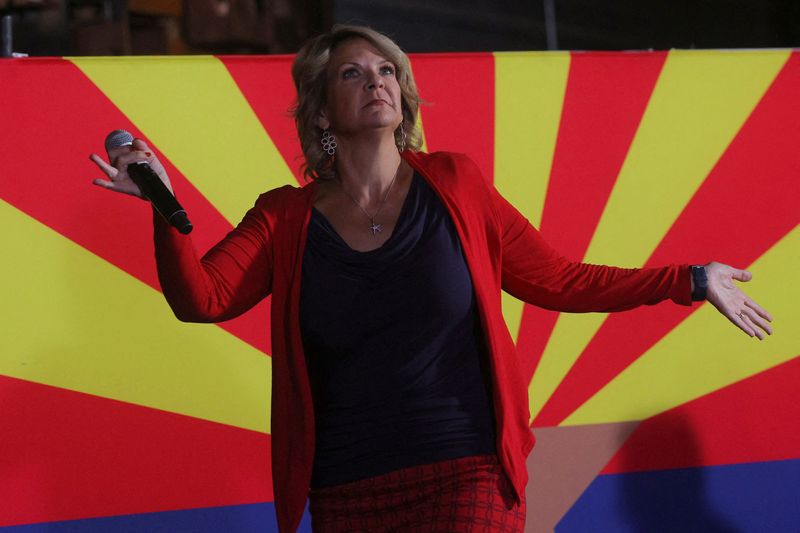By Nate Raymond and Andrew Chung
WASHINGTON (Reuters) -The U.S. Supreme Court on Monday paved the way for a congressional panel to obtain phone records from Arizona Republican Party Chair Kelli Ward, rejecting her request to block a subpoena issued in the investigation into the 2021 U.S. Capitol attack by former President Donald Trump's supporters.
Ward, a Trump ally, had asked the Supreme Court to intervene after lower courts declined to bar telephone carrier T-Mobile from complying with the subpoena from the Democratic-led House of Representatives select committee seeking three months of her telephone records.
The committee sought Ward's records as part of its probe into events surrounding the deadly Jan. 6, 2021, assault on the Capitol by Trump supporters who sought to block Congress from certifying his 2020 election loss to Democrat Joe Biden.
The committee on Oct. 22 sent Trump himself a subpoena to testify under oath and provide documents. Trump filed a lawsuit on Friday in a bid to block the subpoena.
Trump, who is considering another run for the presidency in 2024, has accused the panel of waging unfair political attacks on him.
The panel has said Ward participated in multiple aspects of the attempts to interfere with the 2020 electoral count as Trump allies acted on his false claims that the election was stolen from him through widespread voting fraud.
The records of the calls and text exchanges sought by the lawmakers spanned from Nov. 1, 2020, to Jan. 30, 2021, and covered a period when Ward was part of a group of Republicans who falsely presented themselves as Arizona's presidential electors. The potential use of false electors was part of a scheme to foil congressional certification of the election results.
Ward's lawyers argued that providing the committee with access to her telephone and text message records would violate the constitutional right to free association by giving the lawmakers access to names of Republican party members who spoke with her.
U.S. District Judge Diane Humetewa in Arizona on Sept. 22 backed the subpoena, finding that Ward provided no evidence to support her claims that producing the records would chill such rights or result in harassment of those who interacted with her. The San Francisco-based 9th U.S. Circuit Court of Appeals on Oct. 22 declined to put the subpoena on hold while Ward appealed.
The House committee also has subpoenaed Ward herself as one in a group of people who it said had knowledge of or participated in efforts to send false "alternate electors" to Washington for Trump as Congress prepared to certify the election results. Ward and her husband, Michael Ward, both signed their names on one of the slates of alternate electors for Trump.
Congress certified the election results in the hours after the pro-Trump rioters attacked police with a variety of weapons and stormed the Capitol.

The future of the committee after the Nov. 8 midterm elections is uncertain. If Republicans gain control of the House, they are expected to shut down the committee's work.
Supreme Court Justice Elena Kagan had temporarily put the subpoena on hold on Oct. 28 while the full court decided how to proceed. Kagan is the justice assigned to handle certain emergency requests from a group of states including Arizona.